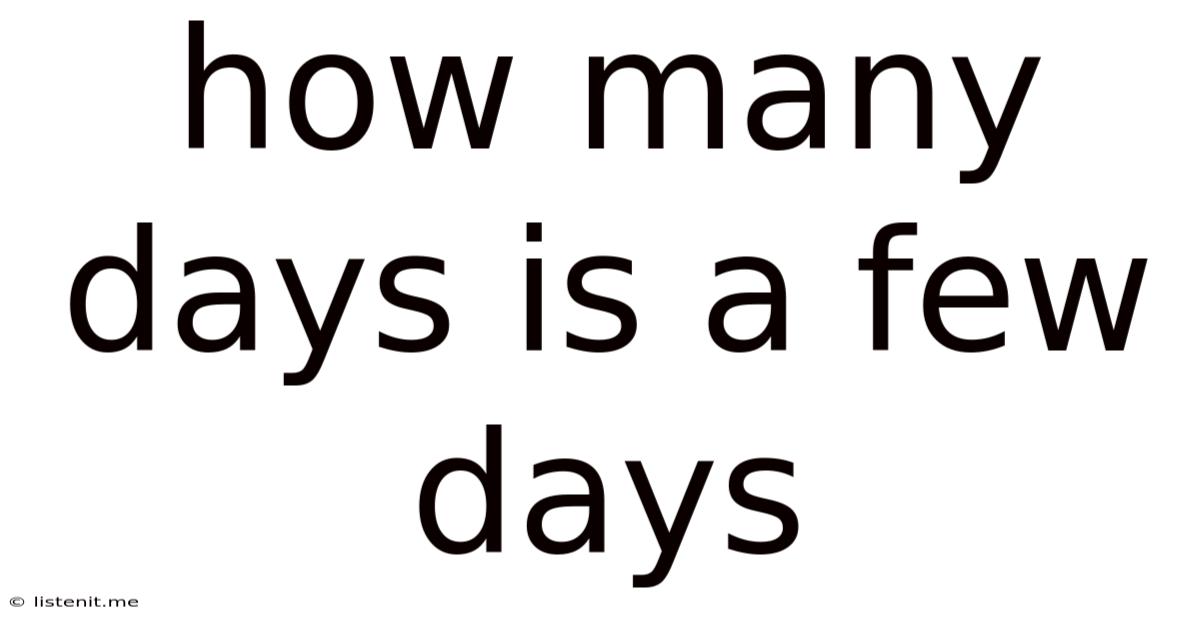How Many Days Is A Few Days
listenit
Jun 15, 2025 · 4 min read

Table of Contents
How Many Days is "A Few Days"? Decoding the Vagueness of Time
The phrase "a few days" is a common idiom, yet its inherent vagueness often leads to confusion and miscommunication. While seemingly simple, understanding what constitutes "a few days" requires delving into the nuances of language, context, and cultural interpretations. This article explores the ambiguity surrounding this phrase, offering insights into its practical applications and the importance of clear communication when dealing with timeframes.
The Elusive Definition of "A Few"
The core problem lies in the ambiguity of "a few." Unlike precise numerical terms like "three" or "five," "a few" is a quantifier that suggests a small, unspecified number. This inherent lack of precision makes it difficult to establish a definitive timeframe for "a few days." The interpretation heavily depends on the context in which it's used.
Contextual Clues: The Key to Interpretation
The meaning of "a few days" is heavily reliant on context. Consider these scenarios:
-
Casual Conversation: In informal settings, "a few days" might represent anywhere from two to four days. It's often used as a general approximation, without the need for strict accuracy.
-
Business Communication: In a professional context, the interpretation shifts. "A few days" could reasonably mean three to five days, possibly even stretching to seven, depending on the urgency and expectations. Ambiguity here can lead to missed deadlines and project delays. Therefore, greater precision is crucial.
-
Medical Context: In medical advice, "a few days" might be interpreted as two to three days, signifying a short-term treatment or recovery period. The shorter timeframe reflects the potential seriousness of health issues.
-
Travel Plans: When discussing travel, "a few days" could range from three to five days, depending on the type of trip and the itinerary. A weekend getaway might only need two days, whilst a sightseeing trip may last for longer.
The importance of explicit communication cannot be overstated. When dealing with important deadlines, commitments, or tasks, it's crucial to avoid relying on the vague term "a few days." Instead, specify the exact number of days involved.
Numerical Estimations and Cultural Influences
While there's no universally accepted definition, several estimations exist:
-
The "Two to Four Days" Range: This is a popular interpretation, particularly in casual settings. It’s a safe estimate for many scenarios, reflecting the generally understood idea of “few.”
-
The "Three to Five Days" Range: This is more likely in formal contexts or situations requiring slightly more time. The increase reflects a higher degree of professionalism and expectation management.
-
The "Up to Seven Days" Range: Some might extend the interpretation to seven days, especially if the context suggests a longer but still relatively short timeframe. However, this is generally considered to be pushing the boundaries of what "a few" typically represents.
Cultural influences also play a role. In some cultures, time is perceived more flexibly, making the range broader. Other cultures prioritize punctuality and precision, thus leading to a narrower, more conservative interpretation.
Avoiding Ambiguity: Strategies for Clear Communication
To prevent misunderstandings, adopt the following communication strategies:
-
Specify the exact number of days: The most effective way to avoid ambiguity is to provide a precise timeframe. Instead of "a few days," say "three days," "four days," or whatever timeframe is appropriate.
-
Use more precise language: Substitute "a few days" with more specific expressions such as "several days," "a short period," "within the next few business days," or "approximately three to five days."
-
Provide context: Elaborate on the circumstances to give the recipient more information to infer the meaning. For instance, instead of "I'll be back in a few days," say, "I'll be back in three days for the project presentation."
-
Confirm Understanding: After expressing a timeframe using "a few days," follow up by asking for confirmation to ensure both parties are on the same page.
-
Use visual aids: If dealing with complex schedules or projects, utilize calendars, timelines, or Gantt charts to illustrate the exact timeframe and avoid any misinterpretations.
The Impact of Miscommunication
The ambiguity of "a few days" can have serious consequences, especially in the following areas:
-
Business: Missed deadlines, unmet project milestones, and strained relationships can result from the vagueness surrounding this phrase.
-
Healthcare: Incorrect medication dosages, delayed treatments, and missed appointments can have severe health repercussions.
-
Legal: Vague timeframes can weaken legal arguments and compromise the validity of contracts.
-
Personal Relationships: Missed appointments, forgotten commitments, and broken promises can damage trust and relationships.
Conclusion: Precision Trumps Vagueness
In conclusion, "a few days" remains a vague and imprecise term. While acceptable in casual conversation, it's crucial to avoid using it in formal settings or situations where clear communication is essential. By adopting clear communication strategies and replacing ambiguous terms with precise language, we can avoid misunderstandings and ensure efficient collaboration and task completion. The key takeaway is to prioritize accuracy and precision over casual phrasing to improve communication effectiveness and avoid potential pitfalls arising from vague timeframes. Remember, when it comes to time management and scheduling, clarity is paramount.
Latest Posts
Latest Posts
-
Best Pokemon Team In Pokemon X
Jun 15, 2025
-
Talking Out Of Both Sides Of Your Mouth
Jun 15, 2025
-
Which Number Comes Next In This Sequence
Jun 15, 2025
-
How Much Over The Speed Limit Is Legal In Canada
Jun 15, 2025
-
No Water Coming Out Of Taps
Jun 15, 2025
Related Post
Thank you for visiting our website which covers about How Many Days Is A Few Days . We hope the information provided has been useful to you. Feel free to contact us if you have any questions or need further assistance. See you next time and don't miss to bookmark.